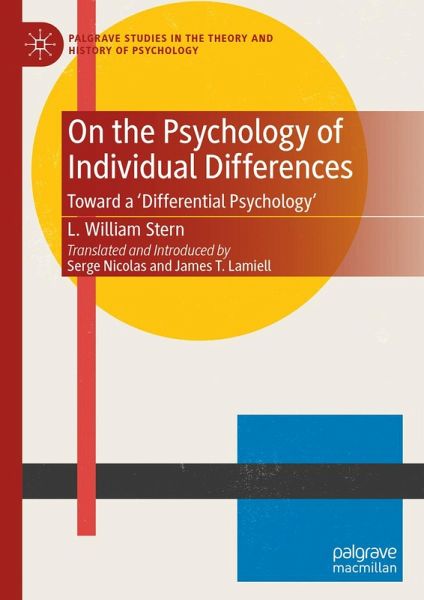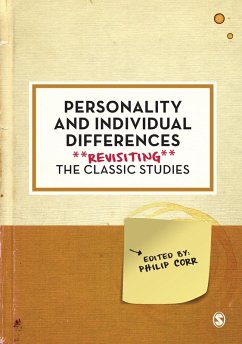
On the Psychology of Individual Differences (eBook, PDF)
Toward a 'Differential Psychology'
Übersetzer: Nicolas, Serge; Lamiell, James T.
Versandkostenfrei!
Sofort per Download lieferbar
104,95 €
inkl. MwSt.
Weitere Ausgaben:

PAYBACK Punkte
52 °P sammeln!
This book presents an English translation, by Nicolas and Lamiell, of the entirety of a German-language text authored by William Stern (1871-1938) and published in 1900. Its publication is widely considered to mark the founding of that sub-discipline of psychology devoted to the systematic study of individual and group differences. The book includes an introductory chapter by Nicolas and Lamiell, placing Stern's work into historical context and discussing its influence on the work of scholars who followed.By making this available for the first time for an Anglophone audience, it fills a signif...
This book presents an English translation, by Nicolas and Lamiell, of the entirety of a German-language text authored by William Stern (1871-1938) and published in 1900. Its publication is widely considered to mark the founding of that sub-discipline of psychology devoted to the systematic study of individual and group differences. The book includes an introductory chapter by Nicolas and Lamiell, placing Stern's work into historical context and discussing its influence on the work of scholars who followed.
By making this available for the first time for an Anglophone audience, it fills a significant gap in the history of psychology literature and offers a springboard into much needed critical discourse on the contemporary state of psychological testing in particular, and on the study of individual and group differences more broadly. It holds fresh insights for those specializing in the fields of personality psychology, educational psychology, and industrial-organizational psychology; as well as to practitioners in the fields of personal and educational counseling.
By making this available for the first time for an Anglophone audience, it fills a significant gap in the history of psychology literature and offers a springboard into much needed critical discourse on the contemporary state of psychological testing in particular, and on the study of individual and group differences more broadly. It holds fresh insights for those specializing in the fields of personality psychology, educational psychology, and industrial-organizational psychology; as well as to practitioners in the fields of personal and educational counseling.
Dieser Download kann aus rechtlichen Gründen nur mit Rechnungsadresse in A, B, BG, CY, CZ, D, DK, EW, E, FIN, F, GR, HR, H, IRL, I, LT, L, LR, M, NL, PL, P, R, S, SLO, SK ausgeliefert werden.












